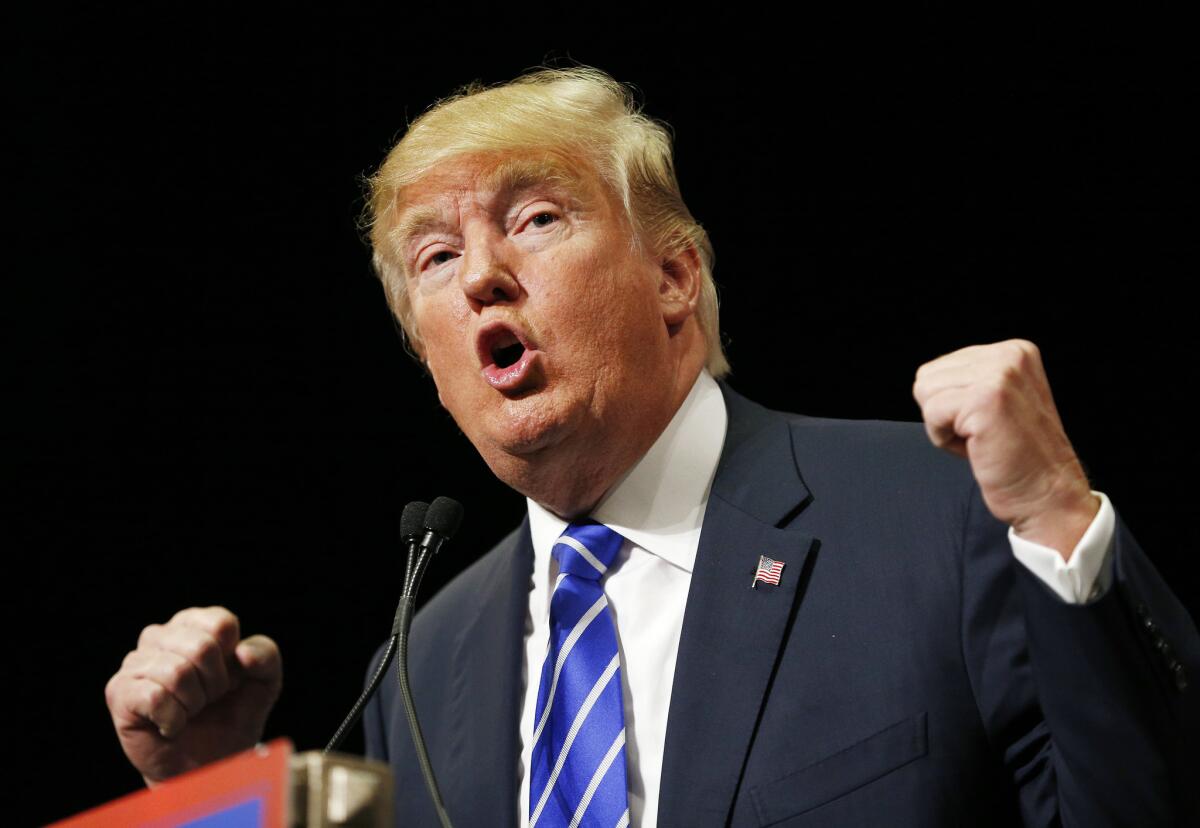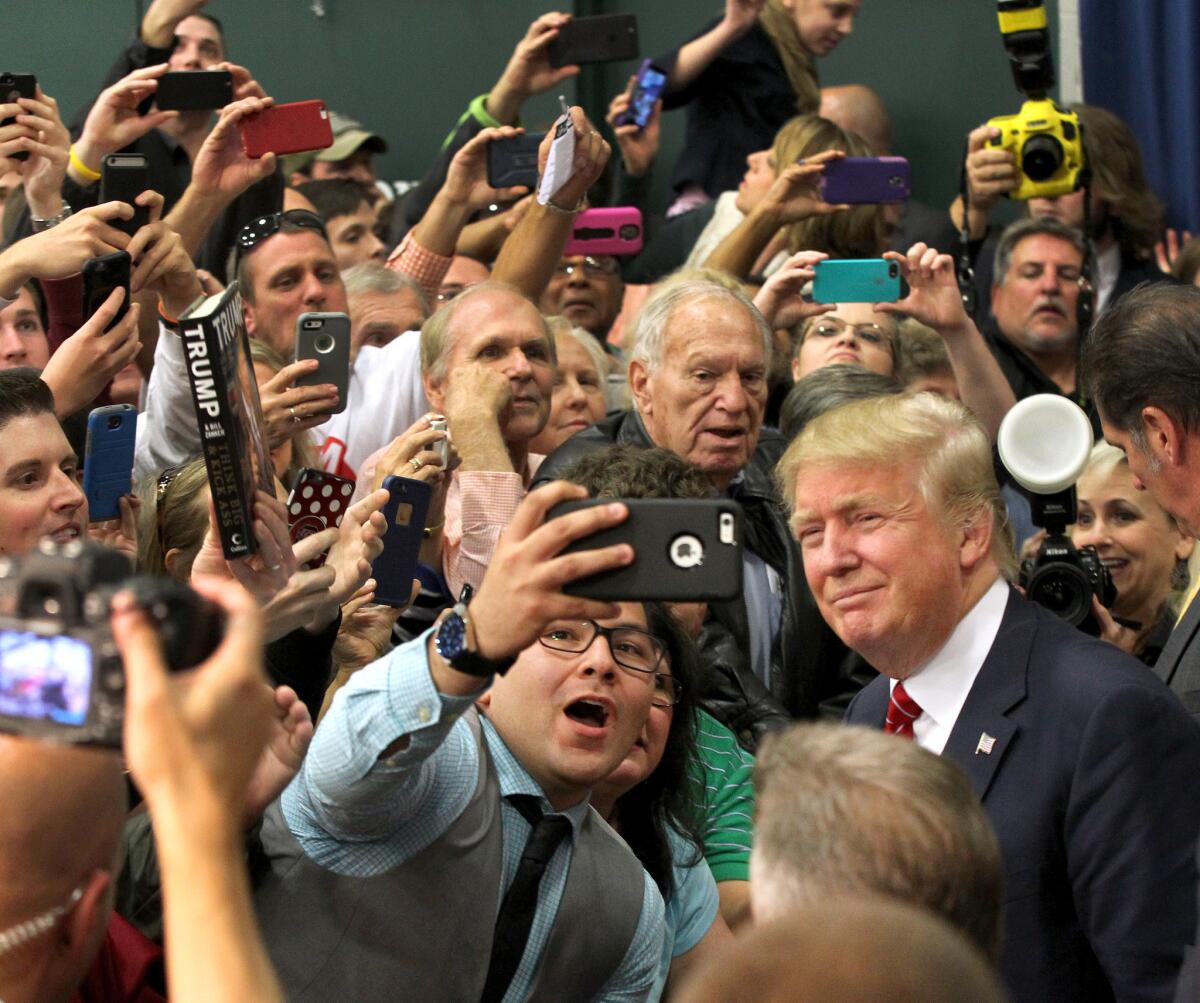Trump donors: No qualms about giving money to billionaire who doesn’t need it

Donald Trump at a rally in Las Vegas on Oct. 8.
- Share via
Donald Trump was under siege — stores were yanking his branded merchandise, Univision was dumping his Miss Universe pageant — and James Radcliffe wanted to help out.
So the 56-year-old New Jersey dentist reached into his pocket and sent $500 to Trump’s presidential campaign, as a way of telling the real estate mogul to stay strong and hang tough.
“Being a billionaire doesn’t mean you’re getting moral support,” said Radcliffe, who appreciates Trump’s uncompromisingly tough talk on illegal immigration. “I think if you’re getting $10, $15, $100 from people, it sends a nice message.”
There are apparently plenty who agree. Nearly 74,000 people contributed to the Republican White House hopeful over the summer, according to his campaign, and it’s a safe bet none of them come close to his stated worth of many billions of dollars.
Although some might question the point of sending money to a person of such extraordinary means, especially one with such conspicuously lavish tastes, more than a dozen interviews with Trump donors around the country found no such hesitation.
People gave because Trump says things no conventional politician dares to say. They gave because it makes them feel like a part of his campaign and, they said, like they were investing in a better future for America.

Donald Trump poses for a photo after speaking in Anderson, S.C., on Oct. 19.
“The guy up there now is working for socialism; he wants us all to be like Russia,” said Mark Treen of Corpus Christi, Texas, referring to President Obama. “He’s not going to stop until we’re just like Mexico.”
They gave because they think Trump drives the mainstream media and the political establishment crazy. And they gave precisely because Trump already has so much money they figure he can’t be bought.
“He can say what he wants.... He doesn’t have to honor anybody after he gets elected,” said James Dewhurst, 85, a retired insurance broker in Moraga, an affluent San Francisco Bay Area suburb, who contributed $500 to Trump’s campaign.
Trump is one of the richest men ever to seek the White House, and a large part of his appeal has been the notion that he is paying for his presidential campaign out of pocket, which distinguishes him, he says repeatedly, from others reliant on big-money donors and the favor of special interest groups.
“I don’t need anybody’s money,” Trump said soon after he announced his candidacy in June. “I’m using my own money.” Weeks later, he amended that, saying he welcomed campaign contributions, large or small, so long as there were “no strings attached.”
In fact, of the $4 million Trump has raised from supporters, about 70% has come in relatively small amounts of $200 or less. He has lent his campaign an additional $1.8 million.
Harlan Slabaugh, 58, calls himself “a middle-income guy, not any kind of player.” Still, the Indianapolis contractor sent $250 to support Trump, inspired by the candidate’s refusal to bow even when his remarks, like those disparaging Mexican immigrants, hurt his business relationship with Macy’s, NBC and others.
“Nobody stands up for what they believe in anymore because the money talks louder than that,” Slabaugh said. “I think he does go too far in a lot of his statements, but I love that he doesn’t back down just because he’s not politically correct.”
Not all of the money Trump received was straight-up contributions. Many were payment for caps, T-shirts and other campaign merchandise bearing his “Make America Great Again” slogan.
Treen, 48, a foundation contractor in south Texas, bought more than $300 worth of bumper stickers and Trump T-shirts, the latter for “the green-card workers” — those with documented legal status — he hires for his building projects. It is, he suggested, a way to make a political statement.
Trump, who sits atop Republican polls, has raised and spent a relatively small amount compared with his main GOP rivals, thanks in good part to the enormous amount of free publicity he has enjoyed.
More than $1.4 million has been paid to his own businesses, including $1.2 million to Tag Air Inc., which controls Trump’s private jet. Nearly $116,000 has gone to Trump Tower Commercial for rent on his Manhattan, N.Y., headquarters.
Under federal election rules, Trump must pay for rental space even if he owns the building and has to reimburse his businesses for any goods or campaign services they provide.
The key to compliance is for Trump’s businesses to charge the campaign precisely fair-market value, said Nick Nyhart, head of Every Voice Center, a group that works to curb the influence of big money in politics.
“If they’re charging too little, it’s in effect an illegal contribution to the campaign,” he said. “If they’re charging too much, it in effect takes the campaign money that his donors are giving and feeds Trump enterprises.”
The Trump campaign did not respond to a request for comment.
None of the donors interviewed were at all concerned about their contributions going to Trump businesses, such as his private-jet firm.
Sharon Day, 57, a retired real estate broker in Lake Havasu City, Ariz., said Trump made an enormous financial sacrifice by giving up his role on NBC’s “Apprentice” and needed to get around the country — so why not fly in his own jet? “I trust him,” said Day, who has donated nearly $300.
Kenneth Mayer, 66, a Platteville, Colo., farmer who has given $750 to the Trump campaign, was more succinct. “Capitalism,” he said, “is great.”
mark.barabak@latimes.com
Twitter: @markzbarabak
michael.finnegan@latimes.com
Twitter: @finneganLAT
Time staff writers Maloy Moore and Anthony Pesce contributed to this report.
More to Read
Get the L.A. Times Politics newsletter
Deeply reported insights into legislation, politics and policy from Sacramento, Washington and beyond. In your inbox twice per week.
You may occasionally receive promotional content from the Los Angeles Times.












